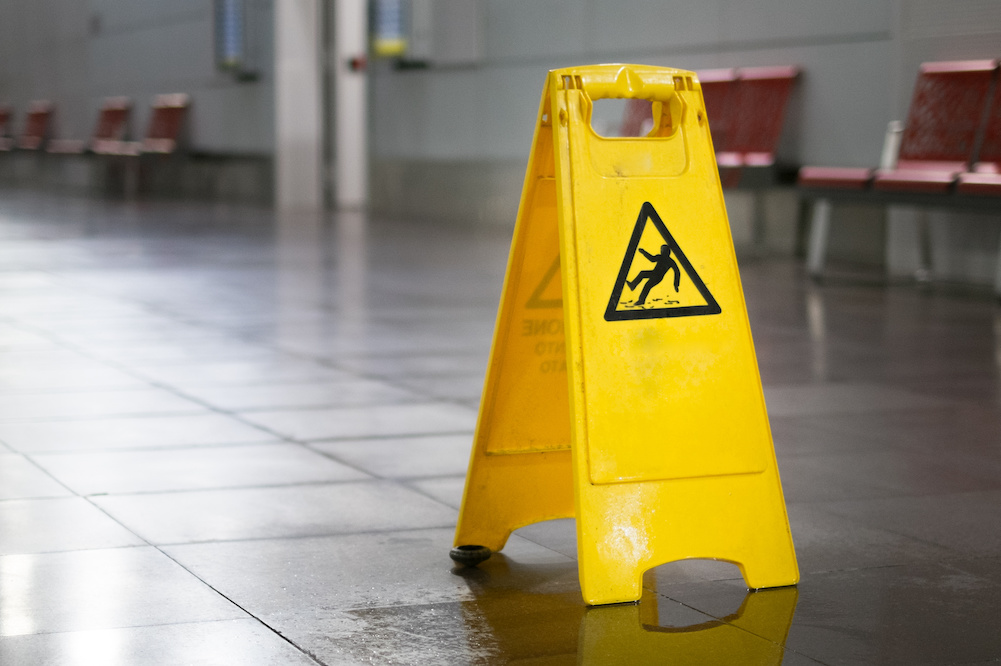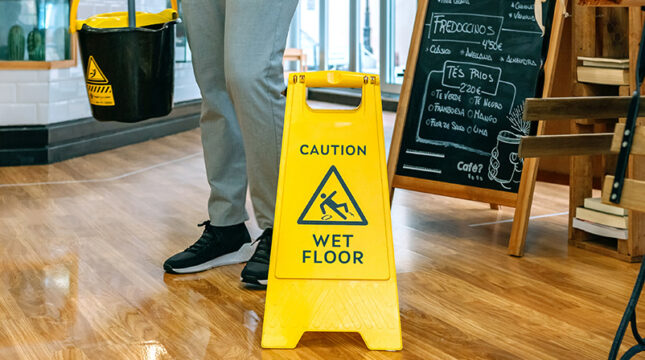Slip and fall insurance is a blanket term for business insurance that helps protect your business from one of the most common accidents — a slip and fall.
What is slip and fall liability insurance?
Learn how general liability coverage can help protect your business from one of the most common risks.


Jump ahead to learn:
- What is a slip and fall accident?
- Insurance for slip and fall accidents
- 6 tips to avoid slip and fall lawsuits
- How NEXT can help protect your small business
What is a slip and fall accident?
When you imagine a slip and fall accident, you might think of a cartoon character stepping on a banana peel and sliding along the floor, pinwheeling his arms and crashing into a wedding cake.
In cartoons, this slapstick slipping cause is all fun and games. In the real world, slip and fall accidents are no joke.
Over 1 million people go to the hospital every year because of slip and fall injuries, according to a recent study.
In fact, 20% of falls cause a serious injury like a broken bone or head injury, according to the CDC. They are also the leading cause of days lost from work for employees.If one of these real-world accidents happens at your business, you might be responsible for the bill. That’s why it’s important to consider business insurance that can offer some financial protection.
Insurance for slip and fall accidents
No one type of insurance covers all slip and fall accidents.
Depending on who’s involved in the accident and what damage occurs, you’ll need different types of insurance to help with the cost of hospital bills, repairs or even lawsuits.
The three main types of insurance that can help protect you when a slip and fall accident occurs are:
1. General liability insurance
General liability is often the first kind of insurance that small businesses purchase because it can help cover the most common accidents at work, including slip and falls for customers and people involved with your business who are not employees.
For example, if a client slips and falls at your business and breaks their wrist, you could be held responsible for medical expenses. Your liability insurance could help cover some of the costs.
It’s worth noting that general liability only covers damage and injuries to third parties, like customers or clients who hurt themselves while on your property.
This type of insurance can also provide financial help if you are responsible for property damage.
Learn more about general liability coverage.
2. Workers’ compensation insurance
Workers’ compensation insurance can provide important coverage if an employee is injured on the job, including slip and fall accidents at work.
In 2020, over 200,000 workers had slip and fall injuries that were serious enough to require days off work.
Workers’ comp can help cover medical bills and lost wages if one of your employees is injured at work. It can also provide financial help for employer liabilty lawsuits if an employee decides to take you to court.
Learn more about workers’ comp coverage.
3. Commercial property insurance
Commercial property insurance can protect the building you do business in if you own it, and your goods, equipment and inventory.
Suppose a customer slips on a wet spot on your floor and crashes into an expensive display case. In that case, your general liability insurance can help cover injuries the customer may have, while your commercial property insurance can help cover the cost to repair or replace your display.
Learn more about commercial property coverage.
6 tips to avoid slip and fall lawsuits
The best way to avoid a slip and fall lawsuit is to ensure a slip and fall doesn’t happen in the first place.
Some simple steps you can take to safeguard your business against slip and fall accidents are:
1. Conduct safety surveys of your business
Keep an eye out for common risks that can cause slip and fall accidents:
- Wet or greasy floors
- Blocked stairwells
- Lose mats
- Torn carpeting
- Clutter
- Power cords or cables crossing walkways
- Bad lighting
Be sure to regularly clear standing water, snow and ice — even in your parking lot and exterior walkways.
2. If you notice an issue, attend to it immediately
If you can’t get to it immediately, put up a sign warning customers and employees about the hazard. Be sure to remedy the situation ASAP.
3. Install a surveillance system
It’s best to have video documentation of what happened rather than solely relying on what the injured party and/or any witnesses report.
4. Contact your insurance company
If a slip and fall accident occurs, it is important to contact your insurance company as soon as possible.
Your insurance provider can provide specific guidance on next steps and what information to gather to resolve the situation quickly.
They may ask for additional information while they prepare to manage an insurance claim. If you have coverage with NEXT, you’ll work directly with a claims advocate to resolve the situation.
5. Document what happened
Gather all the information you can about the incident.
Get statements from everyone involved, including the victim and any witnesses. Even if you have a surveillance system, take photos of the accident area and of any damage that occurred.
6. Take care of the injured person
Most importantly, when an accident occurs, show compassion for the injured person. Slip and fall injuries can be stressful and painful for everyone involved. Take steps to make sure the injured person is as comfortable as possible.
How NEXT can help protect your small business
Slip and fall accidents can happen anywhere, even at a “desk job” or your home office.
NEXT helps small businesses get financial protection from slip and fall liabilities with fast, tailored and affordable business insurance packages.
You can start a quote, customize your options and access your certificate of insurance online in about 10 minutes.







